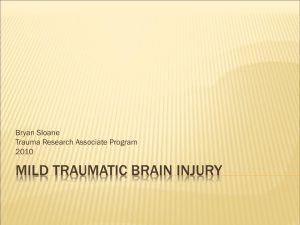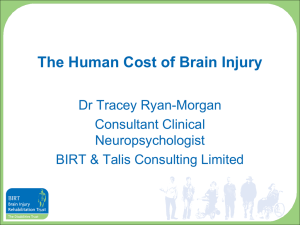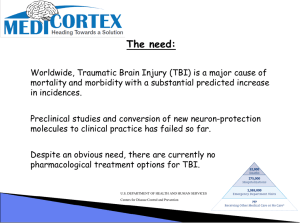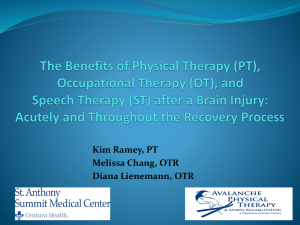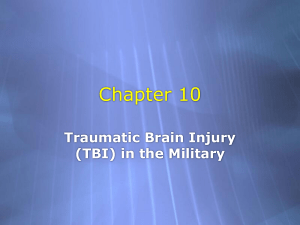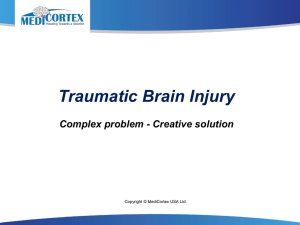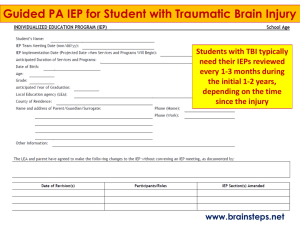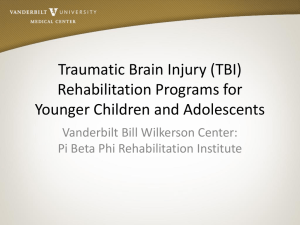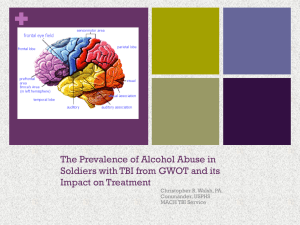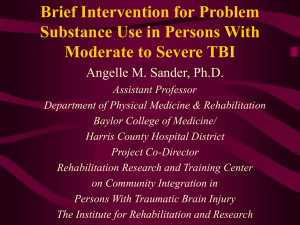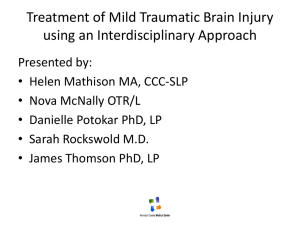Presentation 3 - Equal Justice Works
advertisement
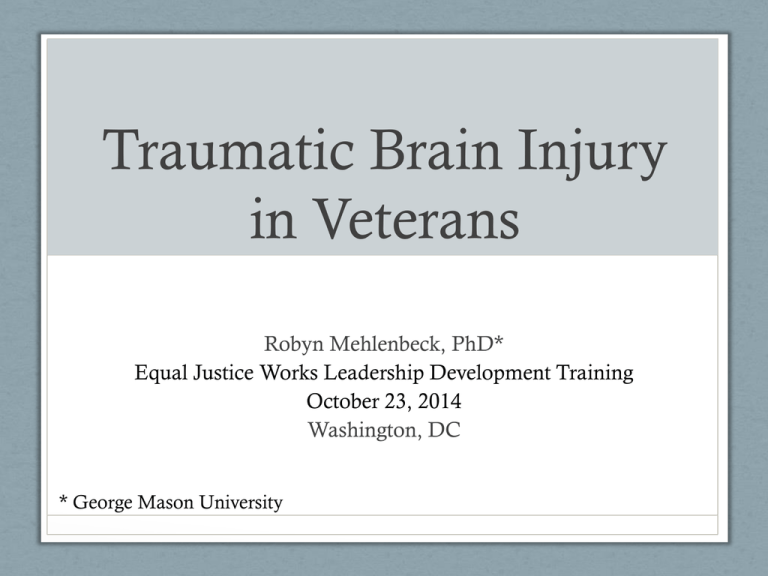
Traumatic Brain Injury in Veterans Robyn Mehlenbeck, PhD* Equal Justice Works Leadership Development Training October 23, 2014 Washington, DC * George Mason University WHAT IS TBI? Traumatic Brain Injury: • Sudden physical damage and trauma to the brain • Focal Lesion: foreign body enters brain, targets specific area • Mild Traumatic Brain Injury (mTBI): affects larger areas of the brain, white matter • White matter responsible for relaying electrical signals around brain 2 Causes of TBI • Transportation accidents • Cars, motorcycles, bicycles, pedestrians (50%) • Falls • Majority of TBI in ages 75 and older from falls • Violence • Domestic violence, firearms assaults, child abuse (20%) • Sports injuries • Approximately 3% • Combat • Separate category, increasingly common in combat due to IED 4 (http://www.ninds.nih.gov/disorders/tbi/detail_tbi.htm) Combat-Related TBI • Especially common in Operation Iraqi Freedom (OIF) and Operation Enduring Freedom (OEF) • 66% of service personnel in Iraq exposed to or injured by a blast injury • Frequently mTBI rather than focal lesion (80% mTBI) • Affects large sections of the brain • Effects not immediately noticeable • Concentration and cognitive decline over time 5 Physical Symptoms of TBI • Unconsciousness (seconds or minutes) • Headache • Nausea and vomiting • Dizziness • Seizures • Weakness • Numbness in arms and legs • Dilated pupils • Metallic taste in mouth • Ringing in ears • Fatigue and lethargy • Change in sleep patterns • Difficulty with motor coordination Psych Symptoms of TBI • Slurred speech • Confusion • Agitation • Memory or concentration problems • Amnesia about events prior to injury • Behavioral changes • Mood changes • Depression • Anxiety • Difficulty with attention • Difficulty with complex thinking Neurology vs Neuropsychology? • Neurology – MD • Specialty that assesses, diagnoses and treats problems with TBI, among other nervous system problems • Treats the physical symptoms and causes of TBI • Neuropsychology - PhD • Looking for behavioral manifestations of TBI • Assesses and treats the cognitive, behavioral and psychological effects of the TBI Types of TBI • Two major types of traumatic brain injury • Penetrating brain injury • Closed head injury 9 Penetrating TBI • Types of penetrating TBI • Skull fracture bone of skull cracks or breaks • Pieces of skull can press into brain tissue • Foreign object enters brain (e.g. bullet) • Damage occurs along path of injury (focal lesion) • Symptoms vary according to part of brain that is damaged 10 11 Closed-head TBI • Results from blow to the head (e.g. car accident, football tackle, impact from IED blast) • Causes two type of brain injuries: 1. Primary 2. Secondary Primary Closed-head Injuries • Contusion • Bruising of brain tissue (swollen brain tissue and blood) • Can be in response to shaking of brain in skull (contrecoup) • Hematomas/blood clots • Occur between the skull and the brain or inside the brain itself • Diffuse axonal injury • Individual nerve cells damaged • Loss of connections between neurons • Laceration • Tearing of the frontal (front) and temporal (on the side) lobes or blood vessels of the brain • Force of the blow causes the brain to rotate across the hard ridges of the skull, causing the tears Secondary Closed-head Injuries • Evolves over time (after trauma has occurred) • Brain swelling (edema) • Increased pressure inside of the skull (intracranial pressure) • Epilepsy • Intracranial infection • Fever • Anoxia: lack of oxygen supply to brain tissue • Without oxygen, brain cells die within minutes • Hematoma: heavy bleeding in or around brain 14 Closed-head Injury Illustration ( http://health.allrefer.com/health/head-injury-prevention.html) What does it mean to have a TBI? Typical Impairments: Communication Thinking/Executive Functioning Psychological 16 Communication Difficulties • Difficulty picking up social cues • e.g. interrupting • Difficulty following conversations • Occasional difficulty modulating tone of voice • Difficulty processing subtleties/nuances in language • e.g. difference between tongue-in-cheek and seriousness 17 Communication Difficulties • More severe difficulties include: • Aphasia • difficulty understanding and producing spoken and written language • Word Recall • Trouble recalling words/speaking in complete sentences • Frequent pauses • Prosodic dysfunction • difficulties with inflection and intonation 18 Cognitive Difficulties • Slower processing of information • Difficulty with short-term memory • Retrograde Amnesia (hippocampus/prefrontal cortex) • Loss of specific memories from pre-trauma (unconsolidated) • Anterograde Amnesia (hippocampus/prefrontal cortex) • Difficulty forming new memories after trauma 19 Cognitive Difficulties • Executive functioning difficulty (prefrontal cortex) • • • • • • Poor planning, organizing skills Setting goals Completing tasks Difficulty solving problems Difficulty with abstract reasoning Difficulty making judgments • Impulsivity (prefrontal cortex) 20 Testing for effects of TBI Comprehensive Assessment with emphasis on Executive Functioning - Can be done by a neuropsychologist - Can be done by a psychologist with extensive experience in the types of tests needed to examine the deficits concerned about Testing for effects of TBI Clinical Interview – looking for some identifying event/incident; any testing prior to the injury is a bonus Cognitive Assessment – WAIS-V; Woodcock Johnson Cognitive/Achievement Executive Functioning – Delis- Kaplan Executive Functioning System (D-KEFS) Rey-Osterrieth Complex Figure Test/Beery VMI Psychological – ADD scales, Mental Status Exam Test of Memory Malingering (TOMM) – gives some validity to whether a client is intentionally exaggerating memory symptoms Rey-Osterrieth Complex Figure Test - Add in figure; & scores on a sample w/deficits Treatment of TBI • Treatment dependent on severity of TBI • Combination of medical management of symptoms & psychological intervention based on deficits • In mTBI Cognitive Behavioral Therapy most common treatment form for psychological effects • Structured work on goal setting/problem solving • Structured work on impact of thoughts on feelings and behaviors • Additional treatment: • • • • Nutrition Education Counseling & family support Medication for symptomatic relief 24
